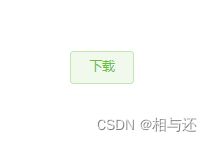vue+springboot使用文件流实现文件下载
前言
本次将使用vue和springboot通过文件流的方式教大家怎么去实现文件的下载,那么话不多说,我们直接开始
相关vue导出文件
以下链接为我其他vue进行下载导出文件文章
vue实现把字符串导出为txt
步骤
文件路径
要进行下载的话,我们肯定是需要一个路径进行获取到我们的文件的,那么本次我们的文件路径是这样:
D:\file\文件名称.pdf
ps: 文件名称.pdf是我进行上传的文件,D:\file\是我本地D盘下的磁盘路径
本次是在文件上传成功的基础上进行的
另外,如果希望知道怎么上传文件可以参考我的文章:
elementUI加springboot实现上传excel文件给后端并读取excel
vue前端代码
前端界面部分,比较简单,就是一个按钮,绑定一个click点击事件方法
本次我使用的框架为elementUI ,其他前端框架也是通用的,最主要是看逻辑部分
具体界面代码如下:
<template>
<div>
<el-button size="medium" type="success" plain @click="downLoadFile">下载el-button>
div>
template>
最终按钮是这样

然后是JavaScript的逻辑部分
本次JavaScript逻辑有使用axios调用后端,具体如何使用和引入,参照百度
export default {
name:"xxx",
data(){
return{
filePath: 'D:\file\文件名称.pdf', // 文件路径
fileName: '文件名称.pdf', // 文件名称
}
},
methods:{
// 下载文件方法
downLoadFile() {
this.$axios.get("/downFile/downLoadFile",{
params: {
path: this.filePath,
name: this.fileName
},
responseType: 'blob'
}).then(res => {
const blob = new Blob([res.data]);
const fileName = res.headers["content-disposition"].split(";")[1].split("filename=")[1];
if ('download' in document.createElement("a")) {
const link = document.createElement("a");
link.download = fileName;
link.style.display = 'none';
link.href = URL.createObjectURL(blob);
document.body.appendChild(link);
link.click();
URL.revokeObjectURL(link.href);
document.body.removeChild(link);
} else {
navigator.msSaveBlob(blob, fileName);
}
})
}
},
}
ps: 这边需要重点提一下,上面的代码
params: 需要传的参数,本次上传到的是路径和文件名称
responseType 我们申明一个blob的文件流的请求类型,让后端返回一个blob流文件,前端接收
res : 后端返回结果,可能被包了几层消息请求,根据实际的请求是决定是res.data或res.data.data或其他
res.headers["content-disposition"]:这里是由后端暴露一个请求头content-disposition,如果你能够直接知道文件名称,后端的暴露请求头步骤可以直接省略
document.createElement("a"): 通过创建一个< a>< /a>的标签,将文件流填入到a标签的url路径的方式把文件下载下来
后端代码
controller层
import org.springframework.web.bind.annotation.*;
import javax.annotation.Resource;
import javax.servlet.http.HttpServletResponse;
@RestController
@RequestMapping("/downFile")
public class DownFileController {
@Resource
private DownFileService downFileService;
@GetMapping("/downLoadFile")
@PassToken
public ResultVO downLoadFile(@RequestParam("path") String path,@RequestParam("name") String name,HttpServletResponse response) throws Exception {
return downFileService.downLoadFile(path,name,response);
}
}
service层
import org.springframework.stereotype.Service;
import javax.servlet.http.HttpServletResponse;
import java.io.*;
@Service
public class DownFileService {
public ResultVO downLoadFile(String path,String name,HttpServletResponse response) {
File file = new File(path);
byte[] buffer = new byte[1024];
BufferedInputStream bis = null;
OutputStream os = null;
try {
//文件是否存在
if (file.exists()) {
//设置响应
response.setContentType("application/octet-stream;charset=UTF-8");
response.setHeader("Access-Control-Expose-Headers", "Content-Disposition");
response.setHeader("Content-Disposition","attachment;filename="+name);
response.setCharacterEncoding("UTF-8");
os = response.getOutputStream();
bis = new BufferedInputStream(new FileInputStream(file));
while(bis.read(buffer) != -1){
os.write(buffer);
}
}
}catch (Exception e) {
e.printStackTrace();
} finally {
try {
if(bis != null) {
bis.close();
}
if(os != null) {
os.flush();
os.close();
}
} catch (IOException e) {
e.printStackTrace();
}
}
return new ResultVO(ResultCode.SUCCESS);
}
}
其中我的返回值ResultVO是一个自定义返回值,如需要,具体的代码如下:
import lombok.AllArgsConstructor;
import lombok.Getter;
import lombok.NoArgsConstructor;
import lombok.ToString;
// 统一响应结果
@Getter
@NoArgsConstructor
@AllArgsConstructor
@ToString
public class ResultVO<T> {
// 响应码 默认1000成功
private int code;
// 响应信息 来说明响应情况
private String msg;
// 响应的具体数据
private T data;
public ResultVO(T data) {
this(ResultCode.SUCCESS, data);
}
public ResultVO(Integer code, String msg, T data) {
this.code = code;
this.msg = msg;
this.data = data;
}
public ResultVO(ResultCode resultCode, T data) {
this.code = resultCode.getCode();
this.msg = resultCode.getMsg();
this.data = data;
}
public ResultVO(Integer code, String msg) {
this.code = code;
this.msg = msg;
this.data = null;
}
}
import lombok.Getter;
/**
* 响应码枚举
*/
@Getter
public enum ResultCode {
SUCCESS(1000, "操作成功"),
FAILED(1001, "响应失败"),
VALIDATE_FAILED(1002, "参数校验失败"),
NO_RESULT(1003, "未查询到相关信息"),
MES_ERROR(1004, "未查询到相关信息"),
NO_AUTHORITY(1005, "无权限"),
DATA_EXIST(1006, "数据已存在"),
ERROR(5000, "未知错误"),
FILE_UPLOAD_ERROR(5001, "文件上传失败");
private int code;
private String msg;
ResultCode(int code, String msg) {
this.code = code;
this.msg = msg;
}
}
结语
以上就是我vue+springboot使用文件流实现文件下载的具体步骤
